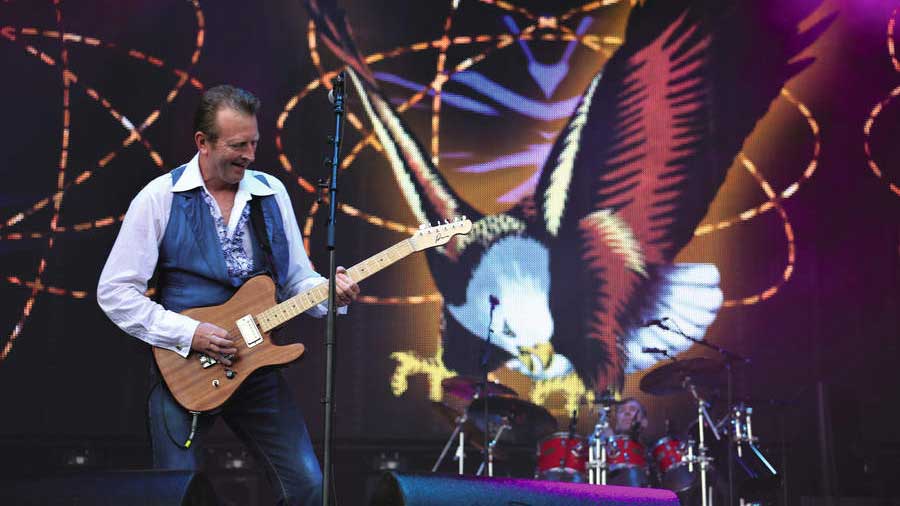
Big Country's 40th-anniversary tour for debut album The Crossing finished in Glasgow on New Years Eve, and a similar tour for second album Steeltown isn't far away: it starts this week in Bristol, with shows scheduled up until Christmas.
Below, guitarist Bruce Watson finds space in his schedule to tell Classic Rock about that 'difficult' second album.

Straight from one anniversary into the next.
Those first three albums came in quick succession. Time goes so fast; I still remember touring for the twentieth anniversary of Steeltown and thinking: “Bloody hell.”
Steeltown was recorded during the miners’ strike of ’84. Your father was a miner.
The Crossing had been the first bit of success I’d had, and that made things difficult. My dad was a miner on strike and so were many of my mates. It was a strange time to be in Dunfermline. Half of the people I knew wanted to pat me on the back, and the rest to punch me in the face.
Steeltown was a textbook example of ‘second album syndrome’. We were so busy touring The Crossing that we hadn’t written anything new. [Producer] Steve Lillywhite was earning so much money, he had to spend a year outside of the country, so we worked at ABBA’s Polar Studio in Stockholm. We spent six weeks in probably what was the most expensive city in the world.
You’ve described Steve Lillywhite as a “genius”. What’s so good about him?
I was the youngest in the band. Stuart [Adamson, guitar] had been in The Skids, and Tony [Butler, bass] and Mark [Brzezicki, drums] had made albums with Pete Townshend and Roger Daltrey, but everything was still new to me. Steve helped me to relax and was willing to listen to my ideas. He was up for just about anything. I learned so much from him and Bill [Gosling], the engineer.
With digital recording still in its infancy there were technical problems at Polar.
From a technical viewpoint, that was a hard album to make. We kept getting spikes and clicks that drove Bill Gosling crazy. Nowadays you can erase them with the push of a button, but back then it had to be done manually. Steeltown has got some great songs and performances, but sonically it’s the one album of ours that deserves a modern helping hand. It’s a harsh record, but then again it reflected harsh times.
Stuart Adamson wrote some great, enduring lyrics. Among the album’s most fascinating moments is the title track, inspired by the flux of Scots who came to England to work in a foundry in Corby during the depression.
Yeah. The first album had been romantic, we left things open to interpretation. With Steeltown nothing was abstract. If you’ve ever been to Corby it is full of Scots. It was a horrible time for a lot of people.
With its political undercurrent, reflecting the Falklands War and unemployment, was Steeltown too dark for the US market?
It probably was. To me it’s a UK-centric album. It wasn’t even released in a lot of other territories. It’s very much of its time.
In the UK it went straight in at Number One.
It’s Big Country’s only British chart-topping album. I seem to remember that we knocked U2 off the top of the charts [with The Unforgettable Fire] for a week, and then they went back up again.
Overall, though, it didn’t sell anywhere near as well as The Crossing.
No. That album had a lot more longevity. Steeltown was Number One, and then it was gone [laughs].
Will you perform the album’s ten songs from top to bottom, or sprinkle them throughout the set?
All of the songs will get played, though not in the original running order. When you’ve got songs that are just as important, or perhaps even more so, it tends to ruin the dynamic.
Liverpudlian alt.rockers the Icicle Works are special guests for the tour. While frontman Ian McNabb has kept that band very much alive, this will be the first time in twenty-five years that he and bassist Chris Layhe have played together.
I love Icicle Works. We first met them decades ago in Newcastle for [Channel 4 TV show] The Tube. I’m really looking forward to having them out with us.
Will there be a new Big Country album?
My son Jamie is in the band [as rhythm guitarist], and we’ve written some stuff, but we’re also both a part of The Skids with Richard Jobson. Big Country has kind of shied away from new material. In a way, what’s the point? You’ll always be compared to the past.
Stuart Adamson took his own life more than twenty years ago. From what you know of him, do you think he’d approve of Big Country’s continued existence?
That’s so hard to answer. When Stuart wanted to leave and park the band up, he told us to get someone in [to replace him]. That’s what we did. We rehearsed with Mike Peters and Simon Townshend together, and Stuart, who was out in Nashville doing his own thing, knew about that. It [the reunion] didn’t happen for a while when Mike ended up joining us, and Stuart had already said go ahead and do it. So I suspect he’d be okay with the idea.
Tickets for Big Country's Steeltown 40th anniversary tour are on sale now.







